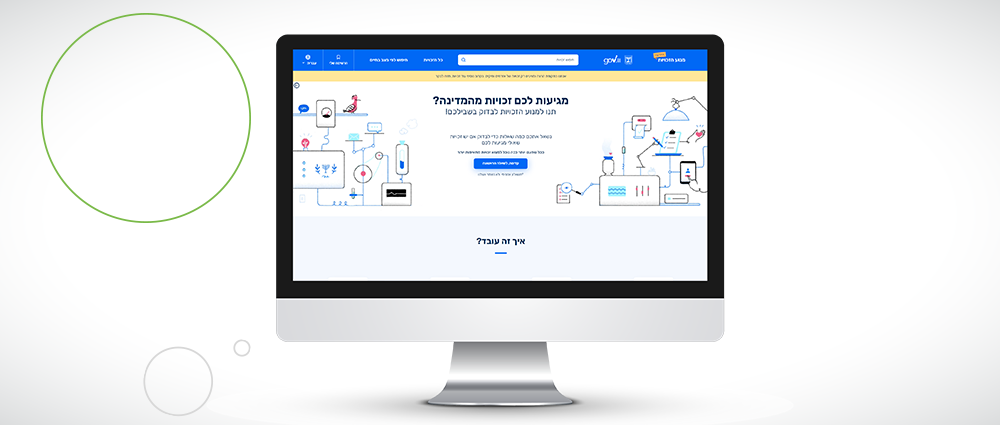You won’t fall off your chair if we tell you that complete, accurate, and up-to-date data is the foundation for the success of any organization. Indeed, in recent years, organizations and companies across various sectors have experienced significant growth in the business information they create and maintain, while the information itself has become richer, more multi-channel than ever before, and increasingly challenging to map. With the increase in the volume and complexity of data, the need for a comprehensive and complete technological solution that enables the management of rich and complex information has also risen.
When individual rights realization meets innovative technology: Meet the National Rights Engine
According to data from the State Audit Committee, the underutilization of rights by the country’s citizens is estimated at hundreds of millions of shekels, and this is where the National Rights Engine comes in: an innovative project born out of a real need that arose from the field, combining an accurate and tailored response to the challenge of managing systemic, comprehensive, and rich information, while also being personal and precise.
The goal of the National Rights Engine is to help every citizen and resident in Israel locate and check their eligibility, in a personalized and anonymous way, for rights granted by law. It is an advanced and unique search engine that allows Israeli citizens and residents to identify their rights based on various parameters and diverse life situations. The engine was developed under the strictest information security and privacy protection standards.
The Rights Engine is currently in pilot mode and currently includes the rights of senior citizens, but in the near future it will expand to include the rights of additional target groups.
The National Rights Engine is a unique and innovative development project that emphasizes the importance of identifying and realizing rights through advanced technological means, while also focusing on the human factor and creating an accessible and user-friendly experience.
The system was established and developed by us as part of a challenge-type tender conducted by the National Digital Israel Initiative and the Government ICT Authority, now part of the National Digital Ministry, with a total budget of approximately 55 million shekels.
The perfect match between rights and their rightful recipients – here’s how it works:
Unlike other systems used to identify rights, the National Rights Engine provides a unique, personalized user experience through advanced technology, a user-friendly interface accessible to all, while maintaining the highest information security and privacy standards.
How did we make it happen?
By answering a few anonymous and secure questions easily, conveniently, and free of charge, the system gets to know the user and gathers the necessary information to match the rights they may be entitled to. The engine bases its results on a powerful rules mechanism that understands the eligibility conditions of the rights in the system and can identify those likely to apply to the user.
Sounds simple, right? And yet, there were quite a few challenges along the way
The main challenge
How do you query, identify, and calculate eligibility conditions for thousands of rights while maintaining a high-quality user experience? For this mission, we harnessed advanced information management technologies, artificial intelligence, and machine learning.
The website and system were developed using our Data Management platform, an innovative, groundbreaking platform for implementing knowledge management and digital transformation systems, integrating advanced AI technologies for natural language processing (NLP) and machine learning.
Privacy By Design – Information security and privacy protection as a fundamental need
The understanding that users provide private information on the website required compliance with the highest standards in the fields of information security and privacy protection. To this end, the project was accompanied by legal consulting and information security and privacy consulting, and various technological measures were implemented to help encrypt the information provided by users.
The perfect fit – uniquely and individually matching relevant rights
To provide a high-quality, optimal, and personalized user experience, the engine calculates which questions should be presented to the user based on their data, achieving the highest possible match. At the same time, to avoid tiring the user with a lengthy questionnaire, only the minimum necessary questions are presented to identify the most relevant rights. To achieve this, algorithms from the worlds of artificial intelligence (AI) and natural language processing (NLP) were implemented in the system.
Thinking of the end user – user research and a unique user experience
How do you develop a system designed to assist diverse populations with varying levels of digital literacy, who nevertheless greatly need its services? The Rights Engine offers a user-friendly, clear, and easy-to-operate interface that provides access to information even for diverse populations such as senior citizens, people with disabilities, or individuals with low digital literacy. For the interface development, extensive and in-depth user research was conducted, including the study of economic behavior, deep characterization of language and microcopy, and graphic design.
Creating a world in 6 months
The establishment of the system began with an in-depth and extensive user research process, a study of economic behavior, a language and microcopy characterization process, as well as graphic language characterization and design.
The next stage involved developing an anonymous and user-friendly questionnaire, through which the system learns to identify the rights available to an Israeli citizen or resident. The questionnaire is easy, simple, and allows optional answers without requiring answers to all questions. In addition to the accessible interface, the engine is based on a smart, dynamic, and personalized learning mechanism that allows the adaptation of questions based on those already asked, filtering out irrelevant questions. Moreover, the unique learning mechanism enables the system to accurately match rights based on the answers and data provided.
It is important to note that despite the technological complexity, the system was developed in an accelerated development process, within only six months, under the strictest information security and privacy requirements set by the government.



